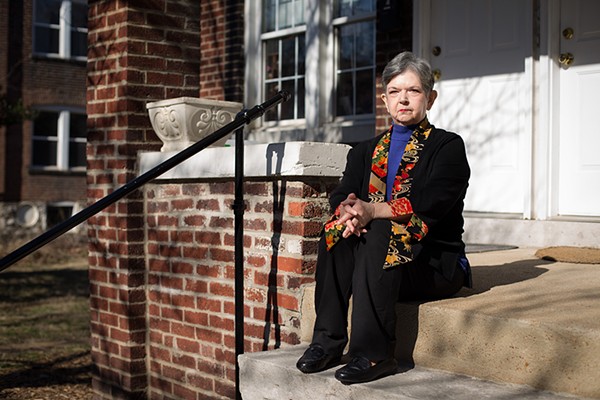
Our Sunday brunch group is known as “The Floozies,” and Magali was our matriarch. Often the only woman at a table full of drunk and bawdy gay men, nobody needed to mind their Ps and Qs around her. The worldly Magali heard it all and it didn’t phase her a bit.
Today, the Floozies lost our matriarch. After not hearing from her for almost a week, I went in to check on her and discovered the worst.
Magali moved from San Francisco four years ago. Below is our origin story as written in House of Villadiva.
Ms. Magali’s Grand Departure
It was around 2003 when my boss Peter, an elegant gay Swedish businessman running a San Francisco property company, abruptly promoted me to a regional manager position after several external hires in a row backed out upon receiving better offers. I was young, about 28, and clearly not ready, but I seized the opportunity.
By far the largest and most complicated property in my portfolio was the historic Cadillac Hotel, which contained over 150 rooms for formerly homeless people above half a dozen commercial spaces. It sat in the heart of the city’s gritty and congested Tenderloin Neighborhood, where at any time of the day or night you were likely to see homeless encampments, prostitution, drug deals, people injecting heroin, and people urinating and defecating on the sidewalk.
Managing the property for decades was Magali, an older, impeccably dressed Cuban woman who had a mythical reputation within the organization. Employee turnover for this type of housing was high, with similar models going through new management teams annually. My friend Wes managed a neighborhood building and was stabbed in the chest by a tenant.
For the most part, corporate policy was to leave Magali alone and pray to God she never left. Magali and the Cadillac were semi-autonomous, mostly reporting directly to the hotel’s hands-on owners, Leroy and Kathy Looper.
I knew that my first order of business was meeting with Magali and making sure she was happy and cared for, so I scheduled a lunch at the famed Cliff House, perched high above the sparkling Pacific and so historically significant, even Mark Twain wrote about it. While Magali was a woman of few words, it was clear she appreciated the way I dealt with her, and the two of us became friends, even doing happy hours on occasion.
Not only was she never attacked by a tenant in all those years, the tenants were wary of her. In Delusions of Grandeur, I recalled a story about one of the times we had to go to court together for an eviction. The tenant was a big, tough-looking ex-con who hadn’t paid his rent, and was making excuses for his lack of payment by citing things he claimed were wrong with the room. The judge pressed him on why he had never reported any of this to management.
The nervous and frustrated tenant stumbled and fumbled before loudly exclaiming, “Your honor, I be AFRAID of Miss Magali!”
When I left after a few years to run an operation in Oklahoma City, she came to visit, and when I then moved to St. Louis, she visited again. I returned to San Francisco for another four years, where I again oversaw the Cadillac.
The gentleman who succeeded me did not have the same regard for Magali, and when Peter retired to Puerto Vallarta the institutional reverence long afforded her all but vanished. After her supervisor came at her the wrong way one too many times, she submitted her notice. She was retirement age anyway, but the problem was she had to leave the manager’s unit she’d been occupying all those years, and the average rent for a studio apartment in the city was more than her entire monthly retirement income.
Born in Cuba, raised in New York, having lived in Puerto Rico, Miami, and then thirty years in San Francisco, moving wasn’t a radical notion, and was something she knew would come at some point. Most San Franciscans, having witnessed the relentless purge of long-term tenants, knew the day would come that they would have to leave. San Francisco was a city for the young and affluent.
She messaged to say that she had quit and would be considering where to move to next.
“If you think you might be interested in St. Louis, I could get you a nice one-bedroom in a lovely neighborhood for $600,” I casually tossed out.
I expected her to possibly consider the offer. Maybe reply with an, “Okay I’ll think about it,” or tell me about all the cities under consideration. Instead, she simply said, “Okay, let’s do that.”
At the time, there were frequent news stories of pets dying on airplanes, and she was worried about her two beloved cats. I spoke to Kage, and we volunteered to fly to San Francisco, rent a car, and drive her and the cats cross country. Three ten-hour days.
I arranged a dinner at the Cliff House for the evening before our departure, and included the surviving Cadillac owner Kathy Looper, who was like a mother to me. The landmark was not only historically significant, but it was personally relevant. I took Magali on several occasions, and once dined there with Kathy Looper and my old boss Peter. I thought of all the history, and how Leroy Looper had since passed away, Peter retired, and how Kathy would be saying goodbye to Magali after so many years. I thought we’d enjoy one last Pacific sunset together.
Even though Mark Twain’s Cliff House story involved fog, I failed to consider the possibility. It was so foggy, you could see the crashing waves below and make out a solitary silhouette on the beach, but nothing more. I wasn’t in the moment as much as I wish I had been either, with some anxiety over a three day drive with cats in the car. But it was still magical, and I’m glad we went.
The next morning we arrived at the Cadillac in a small SUV, and walked in the grand two-story lobby. Rhonda, a young woman who had worked the day shift at the front desk for over five years, gave me a hello pregnant with emotion.
Magali was Queen of the Cadillac, the Leona Hemsley of the Tenderloin (similar intimidating façade but much kinder). Her staff was at her disposal for anything she needed. One evening I was out drinking and decided to stop in with some friends to visit. The elderly Filipino desk clerk was alarmed at the intrusion, and waving his hands said, “No, no, no! Nobody see Miss Magali!” and shooed me away.
Magali was standing with her best friend Jazz and several trusted employees as tenants, scattered about, watched teary-eyed.
“You’re so kind to do this for her,” one woman said.
It struck me because I certainly didn’t see it as an act of charity. She was a friend I enjoyed, and I was always pulling people to St. Louis. But in the Tenderloin, there was a sense of being stuck. Despite being in the middle of everything the city had to offer, it was a containment zone, of sorts. A place of last resort for those with few options, filled with formerly-homeless housing and related services. Even though Magali was not in the same boat as her residents, she did reside at the property, and she had been unsure about where to go. It must have seemed novel for two much younger unrelated men to show up in a shiny new vehicle and whisk her off to a new life far away.
For the tenants and the employees, Magali was an institution, as permanent as the pillars holding up the lobby ceiling. One by one they respectfully said their goodbyes, and it felt like a president leaving the White House for the final time as she made her way out. Even the people on the street, all who knew and respected her, stopped to watch the procession.
I had left the city twice feeling forever young, knowing that Peter was at the helm and that Leroy, Kathy and Magali were at the Cadillac, and they always would be. I felt confident my place was waiting should I ever decide to give it a go for the third time. But the generations before me were vanishing, and I was no longer that young man swinging from the trees. Everything about this departure felt final.
We pulled away from the waving people of the Cadillac knowing the curtains had closed on our San Francisco.
Magali took to St. Louis easily. She loved her apartment near the Missouri Botanical Garden, and even years after living there she’d often say to herself, “so many trees” when we’d drive through the neighborhood.

More than anything, though, Magali loved her people in St. Louis. “I’ve never had friends like the ones I have here,” she once said, and of David and Pauly, who included her on holidays, she said, “They are the nicest guys. I wish everyone in the world were like them.”
People in coastal capitals often don’t have the space to entertain in the home , so she was awed by the way St. Louis queens entertain. We’d attend holiday parties every December weekend where couples like John and Kevin, Jon and John, and David and Pauly would open their lavishly decorated homes and where Magali would mingle, often wearing something silky and elegant, with a favorite broach.
Perfect strangers like Karen Irwin sent her care packages during lockdown. Sam Brown, a man I sent to talk to her about cleaning her apartment, became as much of a support to her as me–and refused to take payment.
Read also: RFT profile on Magali
Everything is so fresh, and I’ll likely go through many emotions, but as I stood outside her building this afternoon watching the birds flutter around the balcony flowers, I felt grateful that she died in a place she loved as opposed to some kind of hospital or institution, and I felt profound gratitude for the way this community treated her.

As usual, you make everyone feel welcomed and special. I never take our friendship for granted!
Chris, Through your writing, you shared Magali with us, and we felt as if we knew her. That is the mark of a great writer, and an even better friend. I am glad she lived in real time, and that the universe crossed the two of you’s paths, and that we knew her through you. Cheers to a life well lived and a beautiful soul.
I will Miss You Miss Magali R.I.P.